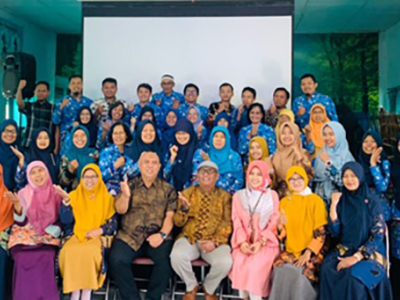Improving the ability to develop Instructional Design for Science Teachers in Sleman Regency

21st-century education encourages students to master valuable skills for being more responsive to change. Teachers, as facilitators, must stay updated with the times. Supporting this, a team of lecturers from the Department of Science Education, Faculty of Mathematics and Natural Sciences, Universitas Negeri Yogyakarta organized a Context-based Instructional Design Workshop which was attended by 30 representatives of science teachers in the Sleman Regency Science Teacher Consultation (MGMP) forum on Saturday (29/7/2023) at SMP Negeri 1 Kalasan.
The Head of the Department of Science Education, Prof. Insih Wilujeng, M.Pd, opened the activity. In her remarks, Prof. Insih explained the importance of science teachers to understand and improve the mastery of Technological Pedagogic Content Knowledge (TPACK) in science learning. "In this era of disruption, to survive, there are at least three things that teachers need to do, namely first providing solutions by increasing competence, synergizing with peers and communities and increasing spirituality," said Prof. Insih, starting the presentation on TPACK. Prof. Insih said that there are five things that teachers need to pay attention to in facing the disruption era, namely mastery of TPACK, understanding Neuroscience, Science, Technology, Engineering, Arts and Mathematics (STEAM) approach, Higher Order Thinking Skills (HOTS) orientation, and 21st-century competencies.
The activity continued with the following presentation by Purwanti Widhy Hastuti, M.Pd., on Context-based TPACK Integration. In her presentation, Widhy began by presenting a case study of the use of technology in the classroom which still has many challenges, especially related to teacher control and content mastery. "In integrating TPACK, a meaningful learning design is needed with a learning context following life (context-based learning)" she said. Context-based learning can be linked to the context of real life and local phenomena or potential. By raising issues close to everyday life, it is hoped that students will be interested in learning more deeply. The stages of Context-Based Learning are contacting (presenting the context), planning (discussing and designing problem-solving), developing (developing the investigation), extending (expanding information related to other contexts), and evaluating (evaluating).
Collaboration between teachers and lecturers in education will undoubtedly benefit both parties. Lecturers will get direct information about what is happening in school-level education so that lecturers can better understand what graduates need to become professional teachers. In addition, teachers can improve their professional and pedagogical competencies to support improving learning quality in schools. The Chairperson of the Sleman Regency MGMP Siti Rochmah Nurwati welcomed and hoped that similar activities could be scheduled on an ongoing basis, not only for the East Sleman Science MGMP, but could tour the entire scope of the Sleman Regency Science MGMP area.(Author: Tyas, Editor: Dedy, Tj.lak)

